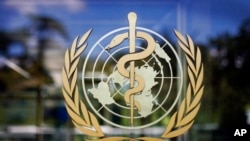The World Health Organization (WHO) Wednesday began a lengthy process to develop an international agreement on the prevention and control of future pandemics.
The WHO’s World Health Assembly – the organization's decision-making body – approved the effort at the end of a rare, three-day special session at the organization’s headquarters in Geneva. The plan, entitled "The World Together," was created as the world is facing the new omicron variant of coronavirus.
WHO Director-General Tedros Adhanom Ghebreyesus praised the decision, saying the pandemic has exposed shortcomings in the application and implementation of international health regulations established by the WHO in 2005.
The agreement would establish international standards on issues ranging from data sharing and genome sequencing of emerging viruses to equitable distribution of vaccine and drugs.
Wednesday’s decision begins the process of drafting and negotiating the agreement, which is not expected to be completed until May 2024.
The European Union (EU) had pushed for the agreement on an international legally binding treaty, along with about 70 countries, but Brazil, India and the United States were among those reluctant to commit to a treaty, diplomats said.
More than 262.22 million people have been reported infected with SARS-CoV-2, the virus responsible for COVID-19, and 5.46 million people have died of it since it emerged in China in December 2019.
Some information for this report was provided by The Associated Press and Reuters.





